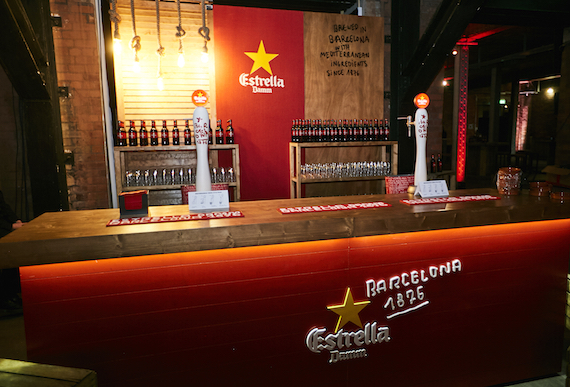Drinks International joined Roca at the Estrella Damm Gastronomy Congress in Manchester last week, where he announced the release of Estrella’s first food and drink trends report.
The 12-page reports details the latest trends within the restaurant business and although Roca does not use beer in his own cooking, he believes that its pairing ability can play a big role for the category.
Roca said: “Our culture has a very long tradition with wine pairing and not beer. But Estrella pairs very well with tapas and I think that is a big opportunity for the on-trade.”
“What I like about beer is that it has so many opportunities because of its soft palate flavor and it’s bitter and sweet at the same time. This makes it versatile and it can be used with so many different pairings.”

Roca has represented Estrella for five years around the world and he stocks it in his restaurant, El Celler de Can Roca.
“I like working with Estrella not only because they’re a Catalonian, but I think they do things well,” added Roca. “They support the gastronomy business a lot and it’s a very refreshing beer.”
The Estrella Damm Gastronomy Congress has previously taken place in Miami, Lisbon, Melbourne, London and Edinburgh and below is a summary of the findings from its first trends report.
Roca worked with Brand Positive to provide insight into the emergence of five key areas, resulting in the production of the trends report for this spring/summer.
Below are the findings from these five key areas, which may benefit the beer pairing industry:
Foraging and botanicals
- The rise of wild foods and modern-day foraging has led to ‘forgotten food’ such as wood sorrel, ramsons and lichen appearing on menus across the UK
- Many ingredients are only available for a limited time throughout the year – they are ‘hyper-seasonal’, which leads to an intuitive style of cooking that is ‘hyper-local’
Local/global suppliers
- Consumers are seeking authentic ingredients and dishes that speak of a region’s heritage and highlight local produce, such as Mallaig Kippers, milk and cream from The Estate Dairy and Mediterranean beer from Estrella Damm
- Diners and chefs are increasingly conducting their own ingredient discovery tours and have been more willing to travel the world to experience a true taste of a region on a plate
Food waste & the circular economy
- Food waste is high on the consumer agenda, leading operators to offer ‘root-to-stem’, ‘nose to tail’ and ‘pollen to petal’ menus, which use all parts of the plant or animal, such as celery root, beet leaves, glamorous offal and whole cods-heads.
- Other waste is being utilised in fermenting, pickling and preserving for spring/summer recipes, while packaging is being recycled into crockery
Plant-based food
- Meat is increasingly seen as a treat, rather than a staple, with a ‘quality up, quantity down’ mind-set becoming more prevalent in response to the ethical and environmental impact of the meat industry
- Consumers are looking for healthier, sustainable diets and are turning to plant-based produce, such as nut and plant ‘mylk’, plant-proteins and unconventional sources of mushrooms, root vegetables and algae.
Transparency
- In a world of fake news, transparency and integrity in food and drink production are the key ingredients in earning consumer trust
- Consumers want to be able to trace a product back through an ethical supply chain to where it was produced, setting a new benchmark for advocacy and loyalty




